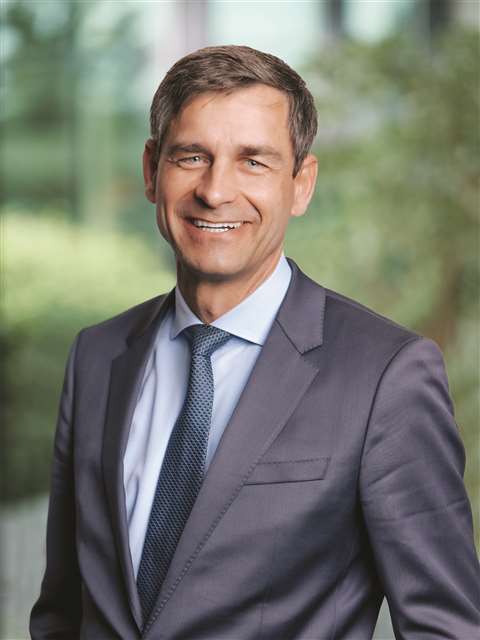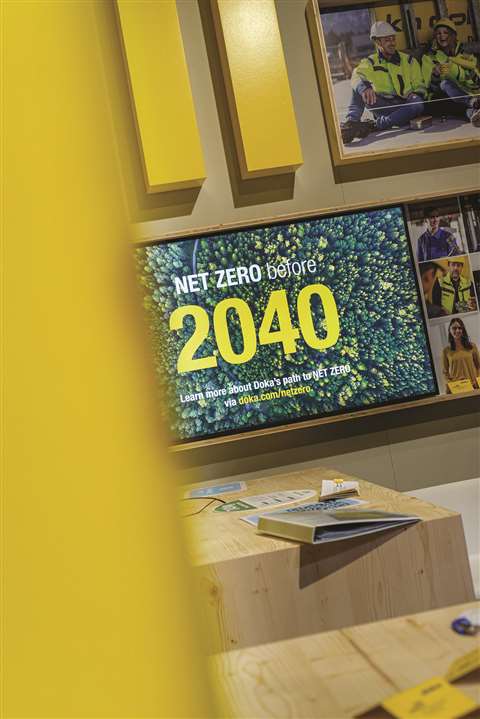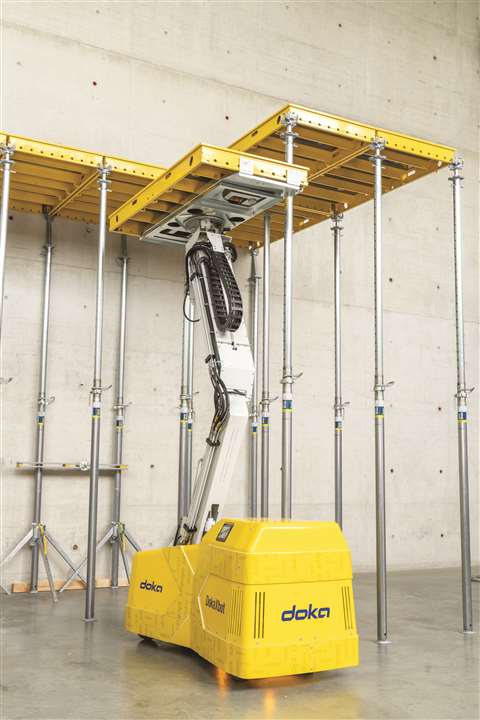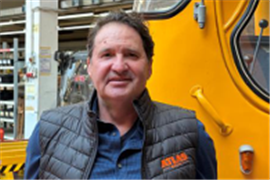Interview: Doka CEO on construction technology
05 January 2023
International Construction speaks exclusively with Robert Hauser
There surely aren’t that many CEOs of billion-dollar companies who take the time to provide a stand tour personally, but at Bauma Munich that’s exactly what Robert Hauser, CEO of Doka, did.
He was knowledgeable, personable and clearly enthusiastic about the new products and innovations as he showed me around the company’s gigantic stand.
Hauser, who became CEO of Doka in 2021 having first joined the company in 2018, was slightly more guarded when we sat down for the interview but the first subject we touched on wasn’t exactly a light topic – how the industry is shaping up against the challenges of supply chain issues, inflation, the war in Ukraine, and the energy crisis.
 Robert Hauser, CEO of Doka. (Photo: Doka)
Robert Hauser, CEO of Doka. (Photo: Doka)
He comments that the company was forced, “in a very short period to find alternative supply sources, which we managed well.
“We found alternative sources and we were able to guarantee to our clients our ability to supply them.”
He adds that, “Doka has implemented a lot of measures so that we are independent from gas, but we also have to look at our raw supplies and when it comes to steel, many steel companies are still dependent on gas.”
Construction and the energy crisis
The energy crisis leads to uncertainly, which is bad for any market. However, construction has been remarkably resilient, and, despite the residential sector cooling, infrastructure is looking very strong.
“In infrastructure, there’s still a very bullish sentiment in the market around the world. In general, when you look forward, our sales outlook is positive on a global level, with the exception of some European countries,” says Hauser.
Europe is the company’s main market, but sights have been firmly set on North America and Asia.
Hauser says that, while there are some differences in customer demands and expectations, the European and North American market are not too dissimilar, so he expects that their product services and digital solutions should transfer over well. Asia is a longer-term bet.
“We see huge growth opportunities in Asia. But these markets still operate at a different salary level of the workers.
“Therefore, they are in their development stage, they are not as far as the high labour market cost markets, like you have in Europe or the US,” he says.
“But the labour cost in Asia will go up, and that will make us more attractive to use, more efficient. That’s why Asia is a very important growth region for us.”
Digitisation of construction
Everywhere in the construction industry, from engine manufacturers to skid steer producers and giant crane and drilling manufacturers, digitisation is occurring.
There is more data available than ever before – increasingly, the question is not whether companies can produce data for customers but if they can do so in way where the data is easy to access and provides the key information required.
“We believe the job site is already digital, but it will become even more digital. Measuring data on a job site, like temperature, pressure, positioning, and extracting that data, storing it and analysing it for our clients is vital,” says Hauser.
“We believe we can make a contribution to increase efficiency and safety on the job site even further.”
There are tools, such as temperature measurement, which mean that someone can determine the exact state of concrete when it cures, allowing them to determine the optimal time to strip the formwork.
This kind of data is incredibly helpful and straightforward – not all data is this clear cut, though. “Data is the goal of the future; it is about measuring as much data as we can and then putting intelligence into it.
“How can you use the data to make better decisions for the construction process in a beneficial way? That’s what, in our innovation efforts, we are focusing on and figuring that out together with our clients – exactly what data and information is useful and then adding more and more of those digital solutions to our DokaXact platform.”
 Doka has calculated the carbon cost of 6,000 of its products, from sourcing the raw materials through to manufacture and use. (Photo: Doka)
Doka has calculated the carbon cost of 6,000 of its products, from sourcing the raw materials through to manufacture and use. (Photo: Doka)
Of course, new technology and the digitisation of construction is inextricably entwined with sustainability.
Put simply, new technology can help to make construction more efficient, which will increase sustainability but also provides a way for emissions to be exactly calculated.
In fact, this is what Doka have done with a staggering 6,000 products.
Construction sustainability
“We have just completed measuring the carbon footprint for all our products. It’s around 6,000 products where we determined the carbon footprint, from sourcing the raw materials, the manufacturing, the usage lifetime of a product right up to the decommissioning,” says Doka’s CEO.
In case you were wondering how long a project such as this takes, the answer is around two years with help from external consultants.
At Bauma many of the products had stickers on them displaying this information, and Hauser says this data is something that customers are finding increasingly useful.
“Our clients appreciate it more and more, as they need to themselves calculate their footprint for their projects.
“They want to know what carbon footprint our products are and then they can make decisions and optimise their carbon footprint by clever product selection.”
Hauser adds that another benefit of doing this is that Doka can see the CO2 footprint of each product and so look at reducing this through different materials or processes and reduce their own footprint.
The company’s declared goal is to be net zero before 2040, and Hauser says that this is a key driver behind all that the business does.
Doka formwork technology
Doka often billed itself as ‘the formwork specialists’ and did not offer any scaffolding options – that changed this year with the company developing its relationship with US-based scaffolding manufacturer AT-PAC to become a majority shareholder.
 The DokaXbot may be commercially available later this year
The DokaXbot may be commercially available later this year
At Bauma scaffolding was prominently displayed on the stand and Hauser says, “We saw in our strategy clearly that we want to become a ‘one stop shop’. We want to serve our clients in the construction industry in a holistic way and therefore we wanted to extend our portfolio and add scaffolding to our portfolio because clients that use formwork most likely will also need scaffolding.”
Another way to grow the business is through innovation and at Bauma Doka was showing off a prototype robot that automatically lifts, positions, and installs formwork.
With labour becoming increasingly hard to find – and expensive – Hauser says the reception to the robot was extremely positive. It is expected to be available commercially from 2024.
It is innovation such as this that that the CEO wants to see more of and which he believes will drive growth. “We want to increase our unique value proposition to the market. We believe that the most efficient way to do that, to differentiate Doka from competitors, is through product and technology leadership,” he comments.
“That means that innovation is at the core of what we do and by innovating our products, services, digital solutions, that’s how we make a big step forward,” he says, adding that he wants to see more, “fireworks of innovation.”
Manufacturing new prototype robots, increasing digital solutions and using technology to map and reduce carbon emissions of products are certainly all good starts when it comes to these fireworks of innovation.
By the time the next Bauma rolls around, in 2025, who knows exactly what developments these fireworks will have sparked and set off.





